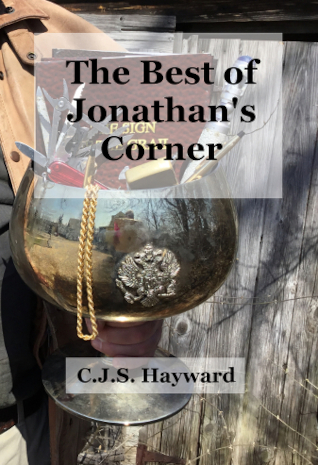A Wind in the Door, by Madeleine l'Engle. Swirls of kything, Charles Wallace, and Blajeny. The Chronicles of Narnia, by C.S. Lewis. Swirls of Narnia and visits to that land. Arthurian legends. Swirls of knighthood, Merlin, and the Holy Grail. Stranger in a Strange Land, by Robert Heinlein. Swirls of grokking, Michael Valentine Smith, and Martian wisdom.
These are some of the "realer world" things I have found captivating over the years, and all of them, in different forms, offer a glimpse of transcendence—and heartache.
There is a scene, central to the plot, in The Silver Chair where a Witch has been weaving an enchantment to seduce the Narnian Marsh-Wiggle Puddleglum and the earthborn children into believing that there is no world outside the underground caverns, no sun, no Aslan and so on and so forth, and when the Witch has practically won, Puddleglum mostly stamps out the spice-laden, narcotic fire with his bare feet, and greatly weakens the enchantment, and tells the Witch,
"One word, Ma'am," he said, coming back from the fire; limping because of the pain. "One word. All you've been saying is quite right, I shouldn't wonder. I'm a chap who always liked to know the worst and then put the best face I can on it. So I won't deny any of what you said. But there's one more thing to be said, even so. Suppose we have only dreamed, or made up, all those things—trees and grass and sun and moon and stars and Aslan himself. Suppose we have. Then all I can say is this, that in that case the made-up things seem a good deal more important than the real ones. Suppose this black pit of a kingdom of yours is the only world. Well, it strikes me as a pretty poor one. And that's a funny thing, when you come to think of it. We're just babies making up a game, if you're right. But four babies playing a game can make a play-world which licks your real world hollow. That's why I'm going to stand by the play-world. I'm on Aslan's side even if there isn't any Aslan to lead it. I'm going to live as like a Narnian as I can even if there isn't any Narnia. So, thanking you kindly for our supper, if these two gentlemen and the young lady are ready, we're leaving your court at once and setting out in the dark to spend our lives looking for Overland. Not that our lives will be very long, I should think; but that's a small loss if the world's as dull a place as you say."
This heroic stance is, in a word, the marketing proposition offered by fantasy.
(Particularly if it is taken out of its context of defending the book's real world, Narnia.)
People who find the world dismal can seek salvation in escape, where there is no true salvation to be found. But there is another option.
Realize that the greater world is not by escape, but by recognizing that the real world is not the dreary, mundane cave that it looks like when you are making Puddleglum's stance.
The Orthodox Church is very much embracing the here and now, and insists that no, there is no other place than the here and now God has given us that we can be saved. Or that we can be happy. But something funny happens along the way.
If we give up Grail questing whether in Arthurian form or its pukeworthy successors, the world seems hollow when recognizing that we cannot ever find or reach the Holy Grail. But when we repent and turn our backs on escape, we discover that repentance is not something to fear but Heaven's best-kept secret, and God the Spiritual Father has placed us in Paradise.
We may discover that after we have given up the hope of any illusion of the Holy Grail that the only game in town is to become the Holy Grail, to receive Christ's body and blood in the Holy Mysteries ourselves, as the Blessed Augustine said, "Behold what you believe! Become what you behold!" and the purpose of being human is to become by grace what Christ is by nature.
If we give up reading fantasy and hoping we could live in that realer world, we may read the Saints' lives, different each day, and find God the Spiritual Father call you to the true realer world.
There are lessons along the way. One is that happiness is not for sometime down the road when we get some new possession, but for here now. Possessions, no matter how badly we want them, do not mediate our really living human life. Another lesson is that the greatest treasures, all of them, we are invited to pursue. The God Who Transcends His Own Transcendence bids us grow in humility, love, and divinity. These eclipse Nobel Prizes, royal honors, and indeed all the honor in the world.
And really, it is an adventure, but it all hinges on repentance and virtue.

